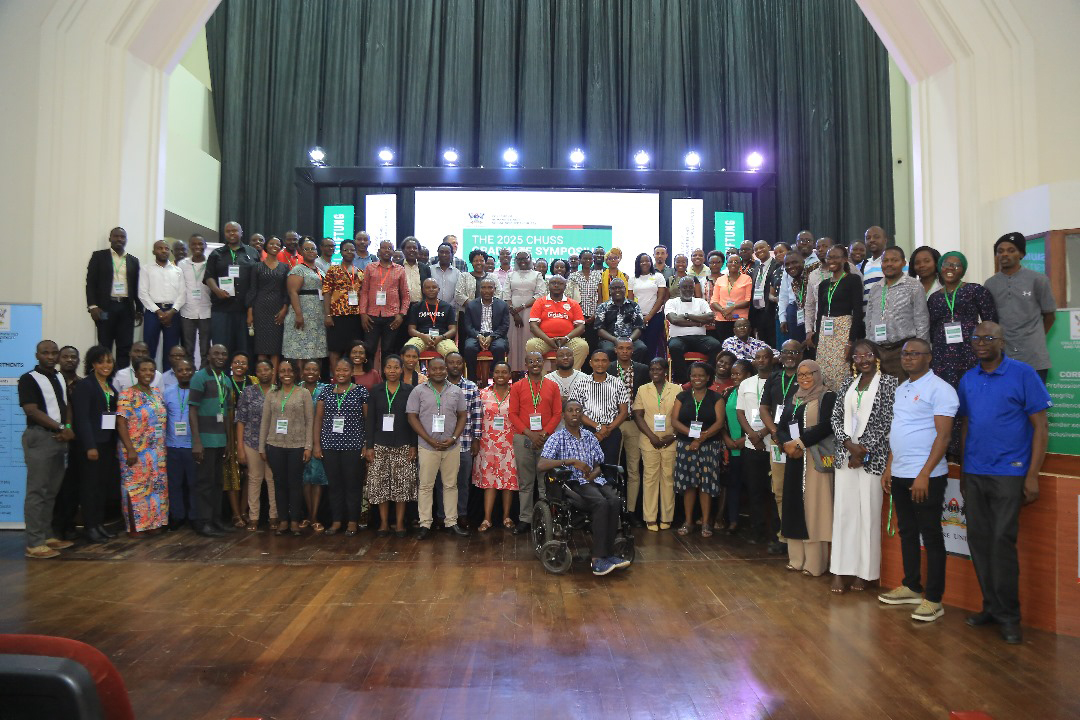By Jane Anyango
Makerere University, Kampala – Saturday June 21, 2025
Professor Ireeta Tumps the Acting Deputy Vice Chancellor for Finance and Administration at Makerere University, officially closed the 2025 CHUSS Graduate Symposium on Friday, urging continued investment in graduate research, mental health support for students, and stronger academic networks across disciplines.
Delivering the closing remarks at the conclusion of the three-day event organized by the College of Humanities and Social Sciences (CHUSS), Prof. Ireeta expressed appreciation to the college leadership, faculty, students, and invited guests for organizing what he described as an inspiring academic gathering. He noted that such symposiums are crucial platforms in the university environment, offering opportunities for research discussions and meaningful academic networking.
“Symposiums are great spaces in the academy for two reasons: networks are built, and conversations around our research practices are held,” Prof. Ireeta stated. “Seeing that this is a gathering of not just faculty, but also graduate students, gives me great satisfaction. I am convinced from what I’ve witnessed here that we can expect better graduate completion rates and a stronger pipeline for future academic staff.”
He praised the College of Humanities and Social Sciences for adopting a student-centered model of research and dissemination, commending faculty members for their commitment to supporting student success through supervision and structured academic guidance. According to Prof. Ireeta, the nature and depth of discussions during the symposium demonstrated the college’s dedication to Makerere University’s mission of becoming a research-intensive institution.
Prof. Ireeta also recognized the leadership of the Principal of CHUSS, Professor Helen Nambalirwa Nkabala, and her deputy, Professor Eric Awich Ochen, for creating an enabling environment for both academic and professional growth. He applauded them for providing space for their teams to “thrive and reach for heights they thought they could not reach,” adding that the college was a “rich mine of talent” contributing to the development of high-quality graduates.
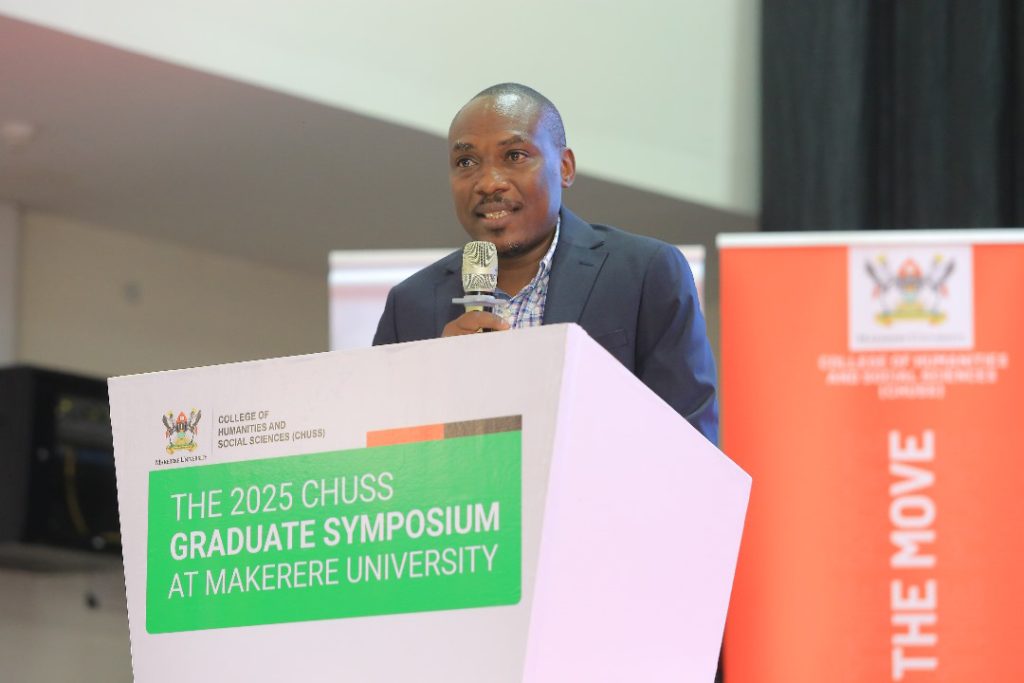
Highlighting the financial and institutional support that sustains postgraduate research, Prof. Ireeta acknowledged several partners and funding bodies. She thanked the Gerda Henkel Foundation for supporting at least ten PhD students annually and for sponsoring this year’s symposium. He further noted the valuable contributions from the governments of Norway, Sweden, and Italy, who have supported various research and graduate teaching initiatives within the college. Rotary International and the Mastercard Foundation were also mentioned for their growing support in graduate training. Additionally, he expressed gratitude to the Government of Uganda through the Research and Innovations Fund (RIF), managed under the Office of the DVC Finance and Administration, for funding select PhD projects.
“These collaborations represent the beginning of a great future for our graduate students,” he said, emphasizing the collective responsibility to nurture and sustain such academic partnerships.
In a more personal and candid appeal, Prof. Ireeta addressed the mental health challenges faced by graduate students. “I have heard that since your supervisors did not die, you will not die,” he said jokingly, drawing laughter from the audience. “But take that advice seriously—especially regarding mental health. It is important to be alive at the end of your graduate studies journey.”
He urged students to remember the lessons from their academic journey and to aspire to become impactful mentors and supervisors themselves in the future. In his concluding remarks, Prof. Ireeta reaffirmed his belief in the potential of the college, stating that “the sky is the limit” for CHUSS.
Prof. Awich Calls for Greater attention to Mental Health in Graduate Training
The Deputy Principal of CHUSS Assoc. Prof. Eric Awich Ochen, called for deeper regional collaboration in graduate education and greater attention to student mental health.
Prof. Awich praised the symposium as a milestone in strengthening research culture and postgraduate training within Uganda and across the region. He noted that the symposium had drawn participants not only from Uganda, but also from Kenya, Tanzania, Nigeria, and beyond.
“This has been an exhilarating three-day journey for our graduate students,” Prof. Awich said. “I have been told that this symposium has involved both master’s and PhD students, and the academic ‘menu’ served has been very rich.”

Prof. Awich underscored the importance of mental health in academic life, highlighting it as a key theme that emerged during the sessions. He noted that well-being is fundamental to academic success and personal fulfillment.
“One of the most important lessons from this symposium has been about mental health,” he said. “Everything we do should be grounded in ensuring we live better — not just individually, but also in harmony with our families, our workmates, and our communities. Happiness, not accumulation, is the real achievement, and mental health is central to that.”
He expressed gratitude to senior professors and facilitators, including keynote speaker Prof. Grace Musila, for their dedication and continued support toward nurturing the next generation of African scholars. He also commended the leadership of CHUSS for consistently investing in quality research mentorship and training.
“Our responsibility as a college goes beyond Uganda,” Prof. Awich emphasized. “As CHUSS, our interest is to support graduate training across Africa. If Africa is to move closer to the rest of the world — to Asia, to Europe — then we need to train not just 10,000 but 100,000 PhDs in the next decade.”
He cited Makerere University’s strategic role as a leading institution in Africa’s higher education landscape and reaffirmed the college’s commitment to contributing to continental academic advancement.
“Our contribution may seem small, but each step we take in this direction is significant,” he added.
Dr. Tibasiima Celebrates Mentorship and Humanity in Graduate Education
Dr. Isaac Tibasiima, convener of the CHUSS 2025 Graduate Symposium, emphasized the importance of mentorship, humanity, and collective responsibility in graduate education.
Dr. Tibasiima acknowledged the efforts behind organizing the event and paid special tribute to the team that made it possible. He credited key figures such as Dr. Edgar Nabutanyi, Levis Mugumya, and several members of the graduate studies coordination team for their commitment to making the symposium a reality.
“When we started this preparation, Edgar called me to his office and said, ‘Isaac, I want you to do this and this,’” he recounted. “What I love about Edgar is that he reminds us constantly — we are the next people staying here. If we are not mentored into what is required, then we’re headed for a crisis.”
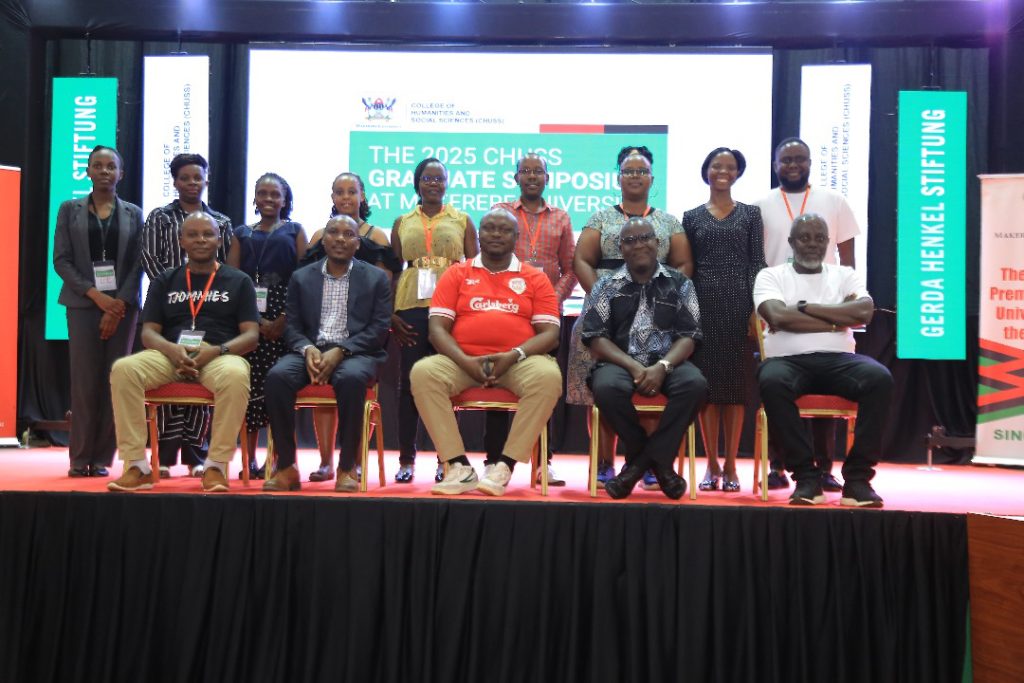
In a lighthearted but deeply sincere tone, Dr. Tibasiima acknowledged the challenges and rewards of coordinating the symposium, which featured both master’s and PhD students from Uganda, Kenya, Rwanda, and other countries. He thanked fellow coordinators including for their teamwork and resilience.
“We sometimes joke about the stress of doctoral committees and seminar series,” he said, “but the effort is never in vain. We do it because we care about graduate education and we believe in the future it can build.”
Reflecting on the journey of graduate students, Dr. Tibasiima offered words of comfort and strength. “We often imagine that graduate school will be a beautiful, smooth journey — but it isn’t,” he said. “Still, we learn through the process. And the most important lesson is that we remain human through it all.”
He encouraged students to embrace imperfection and see learning as a shared experience between students and supervisors. “We as students are not machines, and our supervisors have taught us to be human, too. That is the essence of education — it is not just academic; it is relational.”
Dr. Tibasiima also addressed broader issues facing the humanities, delivering a passionate defense of the discipline. “World over, the humanities are struggling, but they are still alive. We must remind the world that we are not machines. We are human beings — who talk, who feel, who laugh, who cry. That is what the humanities represent, and that is why we are here to stay.”

He acknowledged the support of CHUSS leadership, including the Principal, Prof. Helen Nambalirwa Nkabala, and Deputy Principal, Prof. Eric Awich Ochen, for their guidance throughout the planning process. He also extended thanks to the Gerda Henkel Stiftung Foundation for its ongoing sponsorship of graduate education at Makerere University.
In a pointed reminder to students, Dr. Tibasiima urged those aiming to graduate in January to submit their work by the official deadline of July 31, encouraging all to stay focused and finish strong. “If you’re at the tail end, get to the end. If you’re just starting, we wish you strength and courage.”
He concluded by recognizing participants from across the region and expressing hope for continued academic collaboration. “To our colleagues from Kenya, Rwanda, and beyond — thank you for being here. And for those of us staying at Makerere, may we continue building for the future.”
Graduate Students Hail CHUSS Symposium as Transformative
Graduate student representatives described the three-day event as transformative, affirming its role in equipping young scholars with the tools, confidence, and support needed to thrive in academia and beyond.
Speaking on behalf of graduate students from Makerere University and visiting institutions across Africa, Rugyendo Arinaitwe, a doctoral candidate expressed heartfelt appreciation for the symposium’s impact on their academic journeys.
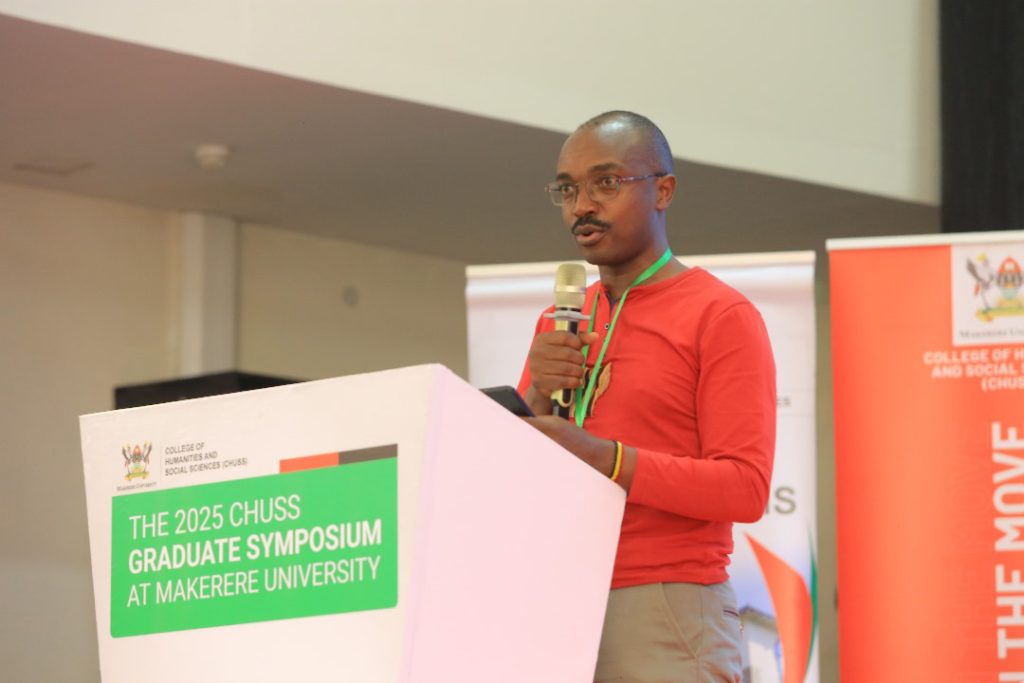
“These past three days have been nothing short of transformative,” Arinaitwe said. “We have not only shared our research but immersed ourselves in a journey of holistic growth. We now understand what rigor, structure, originality, and purpose mean to our supervisors and examiners.”
Arinaitwe emphasized the importance of sessions on academic writing, publishing, and, notably, mental health, which resonated strongly with students navigating the pressures of graduate study.
“In a time when academic expectations are high, the conversation on mental health reminded us that this journey is not a do-or-die endeavor. It’s a slow bloom — and we are growing in our own seasons,” he said.
He also highlighted the feedback from lecturers and facilitators as “a gift — frank, encouraging, and purpose-driven,” adding that the symposium not only sharpened students’ research but also “renewed their confidence.”
In a nod to the increasingly global nature of postgraduate scholarship, Arinaitwe acknowledged the contributions of fellow students from countries including Kenya, Rwanda, Nigeria, and others.
“Scholarship thrives in collaboration, not isolation. Borders are mere lines, but ideas have no boundaries,” he said. “Uganda is not just a destination — it’s an embrace.”
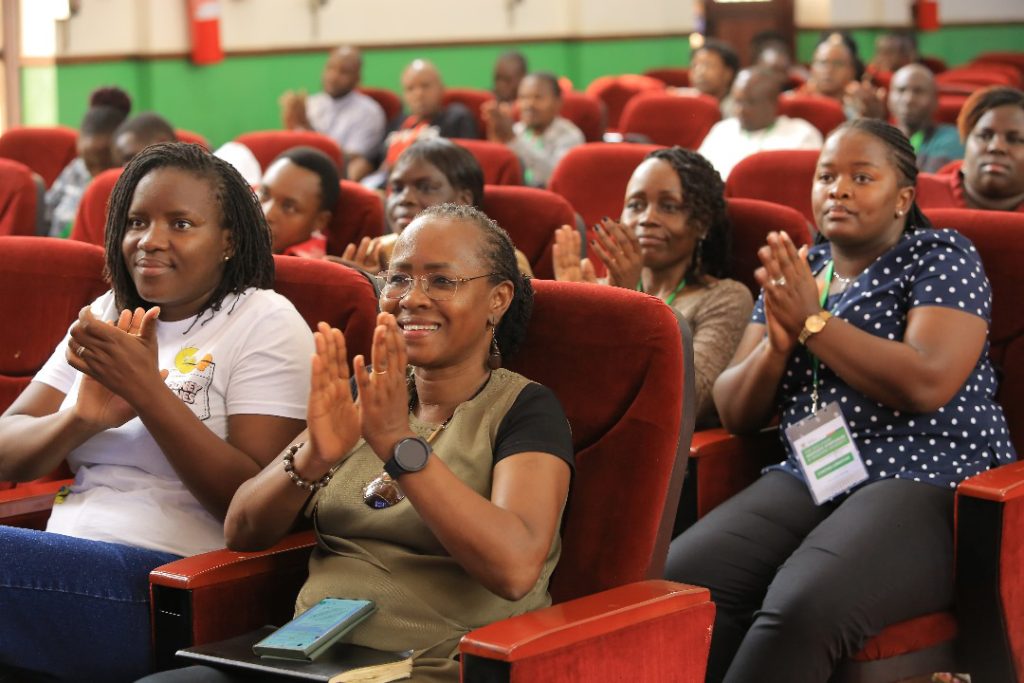
In a final note, Arinaitwe also shared an initiative he is working on — ResearchFindersNews.com, a platform designed to make academic research more accessible to the public. He explained its mission is to translate complex academic work into readable stories using what he called a “musification model” that bridges researchers with policymakers, media, and communities.
“Research should not be trapped in journals, appreciated only by a few. It must circulate, resonate, and serve the public,” he stated
The symposium, which attracted a diverse cohort from across the continent, was also praised by Cynthia Lemanyang, a student from the University of Nairobi. Representing international participants, she applauded CHUSS for its coordinated, interdisciplinary approach to graduate mentorship and training.
“There is something truly commendable about how an entire faculty came together to create space for us to share, learn, and grow,” Lemanyang said. “This level of collegiality and intentionality is something we rarely see back home, and I believe it’s something to be benchmarked.”
She emphasized the importance of institutional support in making such programs possible, expressing gratitude to both the CHUSS leadership and the broader Makerere University administration.
“Without the support of systems and structures, such as we’ve seen here, even the best ideas would remain unrealized,” she said.
Both student speakers echoed a message of perseverance and unity, reminding fellow scholars that while the PhD journey is tough, it is survivable — and deeply worthwhile.
“You will not die,” Lemanyang echoed with a smile, reaffirming the popular symposium mantra. “You will live. And more importantly — you will thrive.”
The CHUSS Graduate Symposium 2025 brought together graduate students, faculty, and international partners in a forum designed to showcase postgraduate research, enhance mentorship, and strengthen academic collaboration across borders. The event marked a critical step in advancing Makerere University’s vision of becoming a research-intensive, globally competitive institution.

